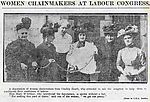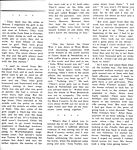 Julia Varley (centre front)
Julia Varley (centre front) Julia campaigned for women's suffrage. She was imprisoned twice.
Julia campaigned for women's suffrage. She was imprisoned twice.  N.F.W.W. leaders - Julia standing on the left
N.F.W.W. leaders - Julia standing on the left Deputation to the Trade Union Congress - Julia standing on the right
Deputation to the Trade Union Congress - Julia standing on the right Julia late in her career
Julia late in her career Interview with Julia 1947 p1
Interview with Julia 1947 p1 Interview with Julia 1947 p2
Interview with Julia 1947 p2

Julia Varley was the first female manual worker to rise to the ranks of the trade union leaders. She was a co-organiser of the Cradley Heath women chainmakers' strike in 1910, working closely with Mary Macarthur and Charles and Thomas Sitch. However, her association with the area came some years earlier, when she was responsible for recruiting the chainmakers of Cradley Heath into the National Federation of Women Workers (N.F.W.W.). She helped to organise the strike campaign. She wrote of her efforts, "We went into the forges, talking to the women as they hammered away, awakening their conciousness to their responsibilities, appealing to their pride and their motherhood." At the Trades Union Congress (T.U.C.) conference that year, she and a group of other women chained themselves to the platform, in order to draw attention to the working conditions of the women chainmakers.
Julia was born on 16th March 1871, the daughter of a worsted mill worker. She began work at the age of thirteen as a sweeper in a Bradford woollen mill. She quickly became a union activist, joined the Weavers' and Textile Workers' Union, became the Bradford branch secretary and one of the Union's executive members, still aged only fourteen. By the time she was 14 years old she was working full time as a weaver, and was the first woman member elected to the Bradford Trades Council. Julia's first experience of industrial action, as a trade union organiser, came during the Manningham Mills' Strike in 1890/91.
From 1904 to 1907 she was a Poor Law guardian in Bradford, which brought her into contact with "tramping" women. In order to gain an insight into the social problems and conditions experienced by poor working class women, she spent time "on the tramp", making her way from Bradford to Liverpool disguised as a tramp searching for her husband.
Julia's early life involved campaigning for women's suffrage, with her sister, in Bradford. She was particularly sympathetic to the needs of working class women. She was one of the first suffrage campaigners to be imprisoned. Indeed, she went to prison twice in 1907. She said, "We work shoulder to shoulder with the men in the mills, and in the councils of the workers; why should they deny us the right to help us choose the men who make the laws that govern the workers..."
Julia's involvement in the suffrage campaign was distinctly separate from her life as a trade union organiser in the Black Country. Her return to trade unionism came through her association with the Anti-Sweating Campaign. She was one of the first members and organisers of the N.F.W.W., founded in 1906, alongside Mary Macarthur. In 1909 she was invited to Birmingham by Edward Cadbury, also a strong supporter of the Campaign. She became secretary to the Birmingham Women Workers' Organisation Committee. On 27th August 1910, she arranged for the entertainment, at Cadbury's, of the "pinafore" girls, where she talked to them about the advantages of joining the Union. 70 women workers from Redditch attended a similar meeting. On many occasions she addressed meetings of the Social Service League at Bournville, the stated aim of which was "to help others help themselves". Julia was very successful in recruiting women from many different trades.
Julia left the N.F.W.W. in 1912 to become a Midlands organiser for the Workers' Union, which amalgamated with the Transport and General Workers' Union in 1913. Her reason for doing so was that she believed women and men should be members of the same union.
For the rest of her life Julia remained a prominent figure in the Trade Union Movement. She served on several Government sponsored labour and trade union organisations during the First World War, and on the General Council of the T.U.C. from 1921 to 1951.
In 1931 she was awarded the O.B.E. for her trade union work. In 1947 she was interviewed for the "Blackcountryman". The interview was re-printed in "The Blackcountryman" in 1975. An extract is included here.
Julia died in Bradford in 1952. Of her life she once said, "God has enabled me to see the fruits of my labours, a joy denied to most reformists."
Rollover the captions in the box to see the available images in thumbnail format, click the caption to see the full-size image
| Reference: | 685 |
| Keywords: | |
| Archive Ref: | 2004/034/001 |
| Updated: | Thu 23 Aug 2007 - 0 |
| Interpretation written by | Barbara Harris |
| Author's organisation | |
| Organisation's website |